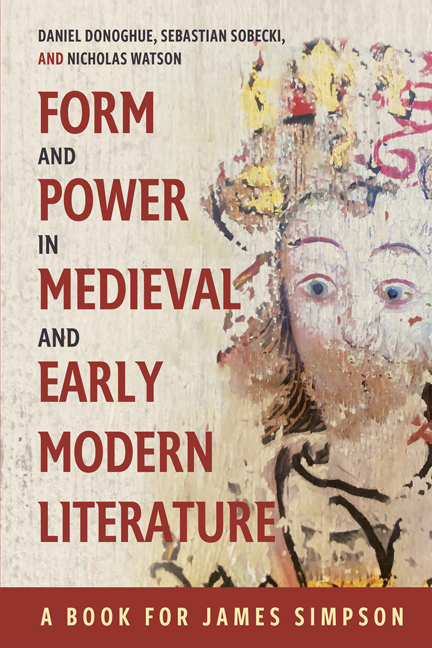Book contents
- Frontmatter
- Contents
- List of Illustrations
- Contributors and Editors
- Acknowledgments
- List of Abbreviations
- Simpson: An Interim Report
- PART I THE HERMENEUTICS OF RECOGNITION
- PART II GENRE AND FIGURE
- PART III CULTURE AND INSTITUTIONS
- PART IV REFORMATIONS
- James Simpson’s Publications from 1984 to 2024
- Bibliography
- A Note on the Bloomfield Conferences
- General Index
- Tabula Gratulatoria
5 - Rarely Obscure and Not a Genre: Medieval Allegorical Narrative
Published online by Cambridge University Press: 17 May 2024
- Frontmatter
- Contents
- List of Illustrations
- Contributors and Editors
- Acknowledgments
- List of Abbreviations
- Simpson: An Interim Report
- PART I THE HERMENEUTICS OF RECOGNITION
- PART II GENRE AND FIGURE
- PART III CULTURE AND INSTITUTIONS
- PART IV REFORMATIONS
- James Simpson’s Publications from 1984 to 2024
- Bibliography
- A Note on the Bloomfield Conferences
- General Index
- Tabula Gratulatoria
Summary
The first time I met James Simpson – tireless scholar, bold critic and shifter of paradigms, generous collaborator and friend – we had a wonderfully exciting conversation about Piers Plowman. I hope that this essay will speak to his transforming work on that allegorical poem, but also to his interest in allegorical hermeneutics and his suspicion of its Reformation opponents.
In the essay I will be taking a hard look at what we mean by medieval “allegorical narrative.” This phrase usefully foregrounds the elements of imaginative figuration and narrative diegesis to be found in these texts. However, many readers have used the term “allegory” synonymously with it, and in long-standing literary-critical practice the two usages seem to be substantially interchangeable. As we will further see, the word “allegory” is also locked into the history of the theorization of the mode. For these reasons, I will keep the two terms in play.
I will be asking three questions. First, why is allegorical narrative/allegory still so often associated with a negatively-loaded notion of obscurity? This obscurity is usually assumed to be a form of purposive esotericism, intended to keep certain kinds of reader out. Of course it is true that there are some medieval texts and commentators that subscribe to a hermetic or “gatekeeping” view of allegorical composition and hermeneutics; but should we read all medieval narrative allegory in light of it? I will suggest not. This first question is almost certainly linked to a second one: is it helpful to describe narrative allegory as structured around a binary polarity that opposes, on the one hand, the languages of diegesis, figuration, indirection or obscurity, and, on the other hand, the languages of elucidation and explication? It is true that a polarity of this sort, along with a recognition of the pervasive presence of glossatory practices in medieval culture more generally, has in recent decades proved a productive hermeneutic in discussions of these texts. Nevertheless, it may be that the critical emphases encouraged by this polarity have had the effect of distorting our sense of the texts they have been used to analyze; in this essay I will be putting this polarized view of narrative allegory under the spotlight.
- Type
- Chapter
- Information
- Form and Power in Medieval and Early Modern LiteratureA Book for James Simpson, pp. 87 - 106Publisher: Boydell & BrewerPrint publication year: 2024

